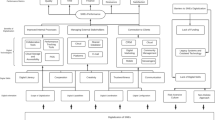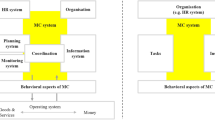Abstract
This article examines effects of new office technology on secretaries' attitudes in the UK and Malaysia. Despite research studies on the impact of this technology, there has been a lack of empirical evidence on secretaries working patterns, interactions and communication, and specifically how new office technology has changed working practices in the culture of offices.
The sample of this research study comprised secretaries and managers in the UK and Malaysia. The main findings are these: Whilst significant historical and political changes are subtle there are shifts which stand out as important. Both managers and secretaries are using new office technology, regardless of the size of organisations. Both access almost the same information, indicating a possible breakdown in the traditional hierarchical structure of management, making secretaries more powerful with new roles and responsibilities. There are some differences due to historical and political backgrounds between the findings in both countries.
Similar content being viewed by others
References
Abdullah, M. A. (1997) Industri Kecil Dan Sederhana Di Malaysaia: Tinjauan Terhadap Perkembangan Program Bantuan. Fajar Bakti Sdn, Bhd, p. 8.
Adams, D. A., Nelson, R., Ryan, and Todd, P. A. (1992) Perceived usefulness, ease of use, and usage of information technology: A replication. MIS Quarterly, June, 227–247.
Agervold, M. (1987) New technology in the office: Attitudes and consequences. Work and Stress, 1(2), 143–153.
Alshoaibi, A. A. (1998) The impact of information technology on organisations: The case of the Saudi private sector. PhD Thesis, University of St. Andrews, UK.
Bell, D. (1980) The social framework of the information society. In The Computer Age: A Twenty-Year View, Dertouzos and J. Moses (eds). MIT Press, Cambridge, MA.
Benet, M. K. (1972) Secretary: An Enquiry in the Female Ghetto. Sidgwick and Jackson, London.
Benson, D. H. (1983) A field study of end-user computing: Findings and issues. MIS Quarterly, 7(4), December, 35–45.
Bryman, A. and Cramer, D. (1997) Quantitative Data Analysis with SPSS for Windows. Routledge, London and New York.
Business Week (1994) Mom and Pop Go High Tech, Special Report, November 21. pp. 212–228.
Clegg, C. and Axtell, C. (1997) Information technology. A study of performance and the role of human organisational factors. Ergonomics, 40(9) 851–871.
Cohen, L., Manion, L., and Morrison, K. (2000) Research Methods in Education (Fifth edition). Routledge Falmer, London and New York.
Douglas, S. P. and Craig, C. S. (1983) International Marketing Research. Prentice-Hall, Englewood Cliffs, NJ.
Everett, D. R. and O'Neil, S. L. (1990) Competencies for information system workers. The Delta Pi Epsilon Journal, 32(2), 41–55.
Forester, T. (ed) (1985) The Information Technology Revolution. Basil Blackwell, Oxford.
Gattiker, U. E., Gutek, B. A., and Berger, D. E. (1988) Office technology and employee attitudes. Social Science Computer Review, 63, Fall, 327–340.
Gory, G. A. and Morton, M. S. S. (1971) A framework for management information systems. Sloan Management Review, 13(1), 55–70.
Helliwell, J. and Fowler, A. (1994) Introducing IT into a mature production related work environment: The human resource factor. Journal of Information Technology, 9, 39–50.
Hutchin, T. (1986) Information technology: Implications for managers. Journal of Information Technology, 1(1), February, 36–37.
Iacono, S. and Kling, R. (1987) Changing office technologies and transformations of clerical jobs: A historical perspective. In Technology and the Transformation of White-Collar Work, R. E. Kraut (ed). Lawrence Erlbaum Associates Publishers, London, pp. 53–75.
Igbaria, M., Schiffman, S. J., and Wieckowski, T. J. (1994) The respective roles of perceived usefulness and perceived fun in the acceptance of microcomputer technology. Behaviour and Information Technology, 13(6), 349–361.
Igbaria, M., Zinatelli, N., Cragg, P., and Cavaye, A. L. M. (1997) Personal computing acceptance factors in small firms: A structural equation model. MIS Quarterly, September, 279–301.
Kraemer, K. L., Danziger, J. N., Dunkle, D. E., and King, J. L. (1993) The usefulness of computer-based information to public managers. MIS Quarterly, June, 129–145.
Kruk, L. B. (1991) In the office of tomorrow. The Secretary, October, 17–18.
Long, R. J. (1987) New Information Technology: Human and Managerial Implications. Croom Helm, London.
Long, R. J. (1993) The impact of new office information technology on job quality of female and male employees. Human Relations, 46(8), 939–960.
Mankin, D., Bikson, T. K., and Gutek, B. A. (1982) The office of the future: Alternatives and choices. The Futurist, 16, 33–37.
Marino, P. (1993) The use of information technology and its relationship to the job characteristics of administrative support personnel. Office Systems Research Journal, Spring, 1–14.
Mawhinney, C. H. and Lederer, A. L. (1990) A study of personal computer utilization by managers. Information and Management, 18, 243–253.
Moon, H. R. (1991) Secretaries play major role in office management. The Secretary, 51(4), 24–25.
Morton, M. S. (1996) How information technology can transform organization. In Computerization and Controversy: Value Conflicts and Social Choices, R. Kling (ed). pp. 148–160.
Nooteboom, B. (1988) The facts about small business and the real values of its ‘Life World’. American Journal of Economics and Sociology, 47(3), July, 299–314.
O'Neill, S. L. (1990) Office Information Systems: Concepts and Applications. Glencoe/McGraw-Hill.
Oppenheim, A. N. (1992) (New Ed.) Questionnaire Design and Interviewing and Attitude Measurement. Pinter Publishers, London.
Pinsonneault, A. and Rivard, S. (1998) Information technology and the nature of managerial work: From the productivity paradox to the icarus paradox? MIS Quarterly, September, 287–308.
Professional Secretaries International and Minolta (1991) Today's Secretary: A Changing Profession in a Changing World. A Summary Report.
Raymond, L. (1985) Organizational characteristics and MIS success in the context of small business. MIS Quarterly, 9(1), March, 37–52.
Ridgeway, C. C. (1983) Educating the secretary: Implications from a survey of secretary's relationship with personnel manager. Journal of Further Higher Education (JFHE), 7(1), Spring, 73–82.
Roach, S. S. (1991) Services under seige: The restructuring imperative. Harvard Business Review, September– October, 82–92.
Robey, D. (1977) Computer and management structure: Some empirical findings re-examined. Human Relations, 30, 962–976.
Sassone, P. G. (1996) Office productivity: The impacts of staffing intellectual specialization and technology. Technology Analysis and Strategic Management, 8(3), 247–269.
Soh, C. P. P., Yap, C. S., and Raman, K. S. (1992) Impact of consultants on computerization success in small businesses. Information and Management, 22, 309–319.
Sullivan, V. (1992) The impact of the computer on the role of administrative support. NABTE Review.
Sullivan, V. and Young K. (1990) An argument for having office support studies in the University system. The Canadian Journal of Higher Education, 20(3), 1–7.
Thompson, L. (1989) New office technology and the changing role of the secretary. WRU Occupational Paper 44, Work Research Unit, January, 1–35.
Thurloway, L. (1992) A bridge across the great divide: Secretarial work, careers and technology. Journal of Industrial Affairs, 1, 44–45.
Toner, P. (1995) Secretarial metamorphosis. Business Education Today, November/December, 7–11.
Turner, J. A. (1982) Firm size, performance, and computer use. In Proceedings of the Third International Conference on Information Systems, Ann Arbor, Michigan, December, pp. 109–120.
Wainwright, J. and Francis, A. (1984) Office Automation, Organisation and the Nature of Work. Gower, London.
Wighton, D. (1999) IT advice for small businesses to be improved. Financial Times, May 21, 13.
Willcocks, L. (1994) Managing information systems in UK public administration: Issues and prospects. Public Administration, 72(1), 13–32.
Yap, C. S. (1990) Distinguishing characteristics of organizations using computers. Information and Management, 18(2), 97–107.
Yap, C. S. and Walsham, G. (1986) A survey of information technology in the UK service sector. Information and Management, 10(5), 267–274.
Author information
Authors and Affiliations
Rights and permissions
About this article
Cite this article
Khalid, H., Swift, H. & Cullingford, C. The New Office Technology and Its Effects on Secretaries and Managers. Education and Information Technologies 7, 257–274 (2002). https://doi.org/10.1023/A:1020863731121
Issue Date:
DOI: https://doi.org/10.1023/A:1020863731121




